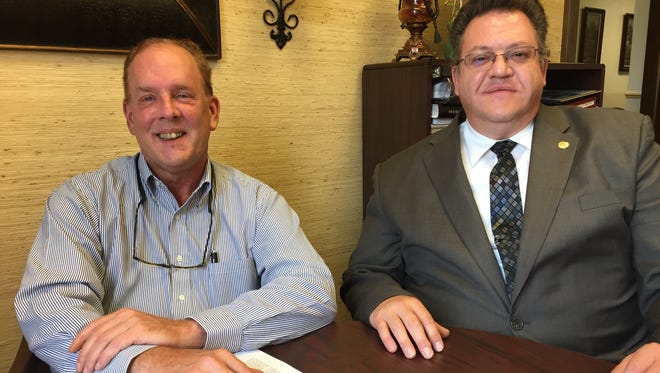Waukesha man sues for double the time, and an open book, to take Illinois bar exam
 Bruce Vielmetti
Bruce VielmettiA Waukesha man who drew national attention to his fight to discharge student loans in bankruptcy has sued the Illinois board for lawyer licensing for refusing him double the normal time and "open book" accommodations to take the state's bar exam.

Mark Tetzlaff has already failed the exam there and in Wisconsin multiple times. But his federal lawsuit says that since he's now considered disabled — because of memory loss — he must be granted the conditions that will best ensure his chance to pass, under the Americans with Disabilities Act.
In a bit of understatement, his federal lawsuit opens with the line, "Mark Tetzlaff is an unusual bar licensing candidate."
Tetzlaff, 59, earned a law degree in 2005 from Florida Coastal School of Law and has worked as a consultant to licensed attorneys, doing research and drafting documents. But his biggest legal victories have been his own.
Representing himself in court, he won unemployment benefits in Florida, a monetary settlement from credit reporting companies he sued in Milwaukee, and argued his own bankruptcy case to the U.S. 7th Circuit Court of Appeals.
That was the case that featured his $285,000 in student loan debt, from law school and other academic pursuits. He failed to persuade the court to apply a more liberal standard for whether his student loan debt could be discharged in bankruptcy, but he attracted help from a notable U.S. Supreme Court advocate on his petition to that court, and some thought his argument might get a hearing, but in the end the court did not hear it.
According to his suit, Tetzlaff is back in law school again, at Temple University, where he's pursuing an advanced law degree in trial advocacy — on scholarship.
He is represented in his Americans with Disabilities Act suit by Milwaukee lawyer Joseph Seifert, who says he has been paying Tetzlaff as a consultant, but would hire him as a full-time associate at $105,000 a year if he were licensed.
The suit calls the denial of Tetzlaff's requested accommodations for the Illinois bar exam egregious. The extra days and open book would allow the test to accurately reflect his "aptitude rather than his disability," it says.
Tetzlaff lives with his 88-year-old mother in Waukesha. They both receive Social Security. Tetzlaff began getting about $1,280 a month in disability income last year, when he was ruled disabled due to memory problems.
He said some of those have improved since he stopped using a cholesterol drug, but he still suffers short-term memory trouble. He said he copes with that in his legal work by using reference materials and notes — things he said would allow him to pass the bar exam.
Before trying to practice law, he worked as a financial analyst, an employee benefits consultant and other jobs. He said he's had to deal with stress like his father's Alzheimer's disease and caring for his elderly mother. He also had some run-ins with the law, for drunken driving and a witness intimidation, which led to convictions in 2011.
Illinois has granted Tetzlaff some consideration in the past. In July 2016, he got 50% more time and use of a semi-private room to take the exam, but failed. This spring, ahead of the July 2017 exam, he asked for 100% more time and the open book provision but was denied. He did not take the exam.
Tetzlaff's not the first aspiring lawyer to invoke the ADA against state bar admissions organizations. A federal judge in California ruled in 2011 that a blind applicant could use a computer for the multistate portion of the exam, after administrators offered only Braille or a person to read the questions.
In New York, a Harvard Law School graduate failed the exam twice before getting extra time and privacy as accommodations for her panic-attack conditions. She still sued last year because she lost a job at a prestigious law firm after not passing the exam in two tries.
JoAnne Simon, a New York lawyer who specializes in testing accommodations and who represented the New York exam taker, is now consulting with Tetzlaff, he said.
Tetzlaff is confident he will prevail in court. He said he'll be seeking an injunction ordering the accommodations so he can take the next Illinois exam in February, and open a satellite office Seifert Law Offices in Lake County next year.
Tetzlaff's treating psychologist, Jonathan Grapengieser, concedes the open book element was an unprecedented request, but critical due to Tetzlaff's memory issues.
On July 22, 2016, the Social Security Administration found Tetzlaff eligible for disability income based on the condition.
A different psychologist diagnosed Tetzlaff with test-taking anxiety in 1991, according to his suit. That got him 25% more time and a fully private room to take the Wisconsin bar exam three times in 2015 and 2016, all of which were unsuccessful.
Tetzlaf's suit seeks a court order that his rights were violated, that the board grant his requested test-taking accommodations and pay his legal costs.
According to Tetzlaff, many licensing boards have been using the wrong standard when it comes to accommodating test takers with special needs. He says Department of Justice rules requires test administrators defer to the conclusions of an applicant's own doctor, not rely on their own consultants' conclusions about an individual.
He expects a victory in court would "set off a chain reaction for any kind of licensing exam" in finance, medicine, and other fields.
It might also allow him to start earning enough money to start repaying his student loan debt
Members of the Illinois Board of Admissions to the Bar were at the July administration of the test in Chicago, and did not immediately respond to emails.